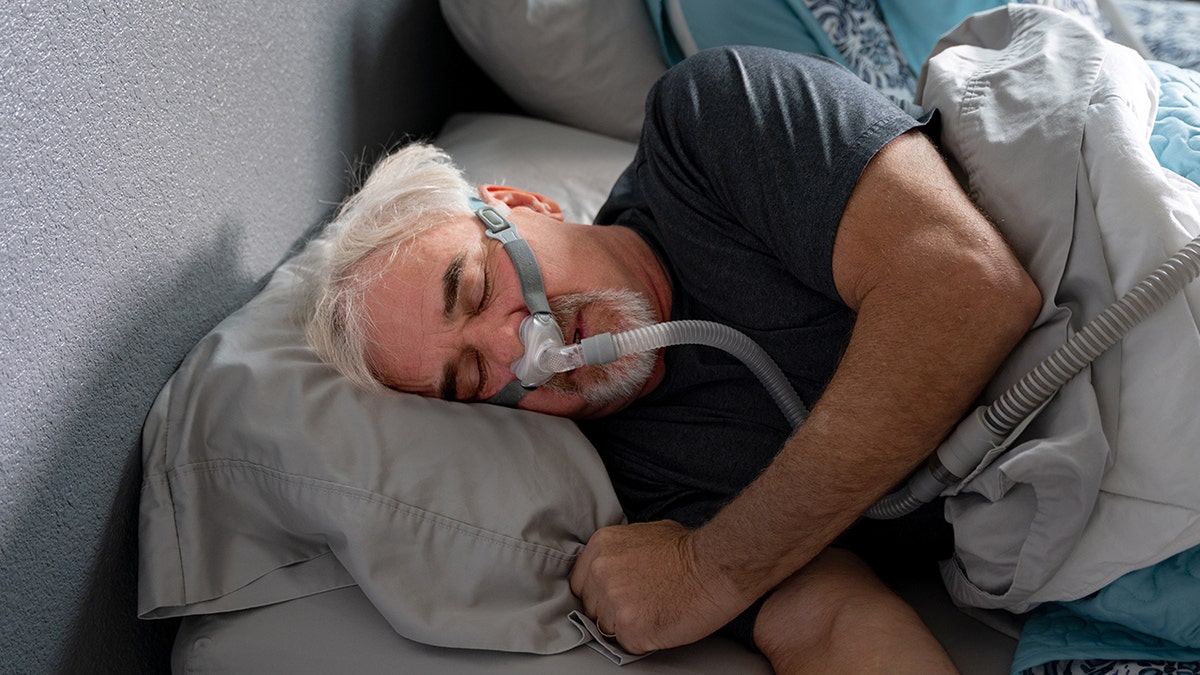NEWYou can now listen to Fox News articles!
Sleeping apart might not be the key to happiness in a relationship.
Recent trends such as “sleep divorce” have highlighted the benefits of sleeping separately from a partner, sometimes even inhabiting different rooms.
The Scandinavian sleep method, a cultural design to improve sleep quality in Nordic countries like Sweden and Norway, has popularized the concept of using two separate duvets on one bed.
COUPLES WHO CUDDLE BEFORE SLEEP REAP KEY HEALTH BENEFITS, STUDY REVEALS
But a new study by researchers in Taiwan suggests that sleeping apart from your significant other may decrease psychological well-being.
The research, published in the journal BMC Public Health, surveyed 860 older adult heterosexual couples in Northern Taiwan to investigate the link between psychological well-being and sleeping arrangements.
The analysis considered both individual and couple characteristics. Psychological well-being was measured by happiness, life satisfaction and fulfillment, while sleep measures were assessed using a detailed statistical method.
The results revealed that older couples who slept in separate rooms had worse psychological well-being compared to the couples who slept together.
‘SOCIAL SLEEP APNEA’ COULD BE RUINING YOUR WEEKEND REST, STUDY SUGGESTS
For older couples, living arrangements, such as sharing a home, were less predictive of psychological well-being than sharing a sleeping space.
The researchers concluded that sleeping arrangements represent a “significant factor” in a couple’s psychological well-being. This underscores the importance of considering sleep “in the context of a couple’s relationship,” they noted.

Wendy Troxel, Ph.D., senior scientist at the RAND Corporation and author of “Sharing the Covers: Every Couple’s Guide to Better Sleep,” discussed the findings in an interview with Fox News Digital.
The Utah-based sleep expert, who was not involved in the study, noted that sleeping apart could impact personal well-being due to psychological distance or withdrawal from a partner.
HIDDEN SLEEP DANGER COULD INCREASE RISK OF 172 DISEASES, MAJOR STUDY REVEALS
“At first glance, that appears to support the commonly held belief that sleeping separately signals something negative in a relationship,” she said.
“What’s unique about this new study is that it suggests the couple’s sleeping arrangement itself may influence well-being, highlighting how intimately sleep and relationships are linked in supporting health across the lifespan,” Troxel added.
Limitations and other factors
Troxel noted the study was cross-sectional, meaning it shows a relationship but cannot prove cause and effect.
“It may be that older couples who sleep apart already face health or sleep challenges, such as chronic illness, sleep apnea or insomnia, which affect both their decision to sleep separately and their mental health,” Troxel added.

“The study also didn’t explore why or how couples made the decision to sleep apart, which is often the biggest factor in determining how that choice impacts the relationship.”
Older adults face “double vulnerability” when it comes to sleep and mental health, Troxel said, as studies show that up to half of adults over 60 report insomnia symptoms or another form of disrupted sleep.
CLICK HERE TO SIGN UP FOR OUR HEALTH NEWSLETTER
“As we age, sleep tends to be lighter and more fragmented, and we see a shift toward earlier bedtimes and wake times, and reduced slow-wave deep sleep,” she said.
Other mental factors such as depression, loneliness and anxiety are also more common with aging, which can further disrupt sleep and create a “feedback loop that undermines mental health,” Troxel said.

Personalized routines
There’s no one-size-fits-all model for healthy sleep, according to Troxel.
“For some, sharing a bed fosters closeness and security,” she said. “For others, especially when sleep disorders or incompatible habits are at play, separate bedrooms can be a wise and health-promoting choice, provided that couples arrive at this decision through open and honest communication.”
TEST YOURSELF WITH OUR LATEST LIFESTYLE QUIZ
Troxel noted “strong evidence” that supports physical closeness, like cuddling, can benefit mental health.
Sleeping together and cuddling can trigger the release of oxytocin, which is considered the “love” hormone, and can also lower stress hormones and promote feelings of safety, which can help with emotional regulation and sleep quality.

Despite these benefits, partners moving around in bed, snoring and having differing body temperatures can also cause sleep disruption and deprivation, Troxel noted.
“Chronic poor sleep erodes mood, empathy and patience, key ingredients in a healthy relationship,” she said.
CLICK HERE FOR MORE HEALTH STORIES
Couples who choose to sleep apart can still nurture connection and intimacy by sharing an evening wind-down routine before heading off to separate sleeping arrangements, Troxel suggested.
“Ultimately, the healthiest sleeping arrangement is the one that supports consistent, quality sleep, emotional connection and long-term well-being.”
Read the full article here










